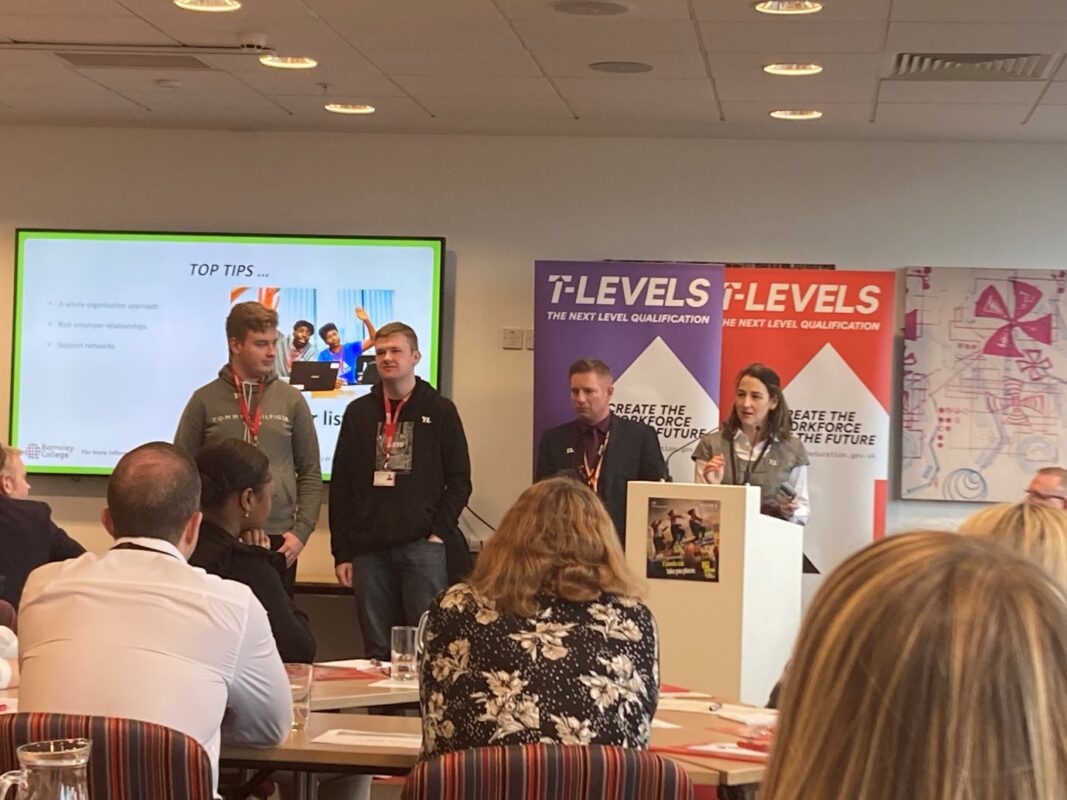T-levels
T-Levels – the new technical post-16 qualification available in schools and colleges all over the country – are making a huge difference.
These pioneering new qualifications offer students a mixture of classroom learning and ‘on-the-job’ experience during an industry placement of at least 9 weeks.
Here’s everything you need to know about T Levels.
What are T-Levels?
They are technical qualifications – equivalent to three A Levels – that combine classroom study with industry placements so that students gain the skills and experience they need to progress into work, further study or an apprenticeship.
T Levels have been designed so that not only are they of the highest standards, but also so that they equip those who study them with the skills that will help them in the workplace, with content designed with over 250 employers including Fujitsu and Amazon.
T Level courses include the following elements:
- A technical qualification, which includes
- Core theory, concepts and skills for an industry area
- Specialist skills and knowledge for an occupation or career
- A meaningful industry placement with an employer of around 9 weeks
- A minimum standard in maths and English if students have not already achieved them.
T-Levels were introduced in September 2020, and the first set of students are now completing their studies before they spend the next few weeks eagerly anticipating results day in August 2022. The new qualifications are aimed at 16 – 19 year-olds and are equivalent to three A Levels. The difference being that the two year courses focus on vocational skills and incorporate a substantial industry placement with an 80/20 split between the classroom and workplace.
Ensuring knowledge and relevant skills competence for their aspiring role
To ensure qualifying cohorts gain complete knowledge and relevant skills for their aspiring roles, awarding organisations work closely with employers and providers during development to understand and continually review sectors’ current and future needs.This means that at the end of their course, students are in a position to follow a variety of progression routes, including moving straight into skilled work, or applying for further study. This may be achieved through a higher level apprenticeship or a university degree.
The placement of approximately 45 days gives T-Levels an edge for both students and employers. While students benefit from real-world experience, applied learning and an opportunity to hone any skills they struggled with in the classroom, employers can engage in an extended recruitment drive with minimal costs. As well as this, throughout their engagement, employers will be in a position to gain insights to their industry’s future workforce. The extended length of the placement also means that, unlike one-week work placement options, students have sufficient time to establish themselves and add true value to their workplace.
Challenges of T-Levels
Of course, T Levels don’t come without their fair share of challenges. Although an extensive placement presents clear advantages, it also means that for every student enrolled, a suitable appointment needs to be found. With over 5,000 students registered for a T Level course in 2021, there is a clear need for employer support across multiple industries throughout England. Having built their core knowledge of a subject, T Levels also allow students to develop a specialism. For example, the new Craft & Design T Level that will go live in September 2023 offers Ceramics Maker as an occupational specialism.
However, industry clusters in England mean such opportunities are concentrated around the Potteries in Staffordshire. Whether students come from Penzance or Penrith, all courses and their required placements must remain accessible to them. This relies on insights gained through employer and provider engagement, which awarding organisations heavily invest in facilitating.
This new approach to vocational study provides young people with options. University and academic routes have been the expected, unquestioned pathway for too long. I vividly remember sitting among my peers in my sixth form study centre while we were briefed on how to apply to university, application forms being passed around with no mention of any alternatives. That’s not to say that a university degree is not a truly valuable qualification. However, it’s value is limited if it doesn’t equip you with a technical foundation on which hundreds of young people hope to build a career.
Neither an academic nor vocational pathway is better than the other. They are just different. This difference is reflective of the endless opportunities across the employment landscape, and T-Levels provide a truly valuable opportunity for young people to support their learning with real-world experience.
T Level in Catering
T Level in Legal services
T Level in Science
T Level in Healthcare Science
T Level in Health
T Level rollout takes next steps
Students looking to study technical qualifications when they’ve completed their GCSEs will have clearer training options that help them get high-skilled, high-paid jobs, as more…
Barnsley College hosts T Level event
Barnsley College welcomed Alex Burghart MP as it hosted the annual Building the Future with T Levels event. The event, which saw The Education Funding…
Alex Burghart sets out the future of skills
Minister for Skills @AlexBurghart addresses @Policy_Exchange Thanks very much David and thank you, all of you, for coming here today (4 Apr). I’m very grateful…
T LEVEL AMBASSADOR NETWORK STRENGTHENED BY COLLEGE APPOINTMENT
The rollout of new technical qualifications has been given a boost by the appointment of a vice chair from North Warwickshire and South Leicestershire College…


